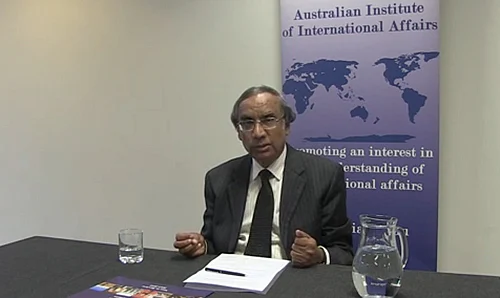India’s policy towards Rohingya is articulated better by MEA than MHA: fmr envoy to Myanmar
Rajiv Bhatia said that Kiren Rijiju’s statements on Rohingya refugees shouldn’t be taken at face value, amid the aid package to Bangladesh and MoE’s recent statement asking Myanmar to show restraint

The decision to supply aid package to Rohingya refugees in Bangladesh by India is a welcome development and shows New Delhi’s commitment towards helping the persecuted Muslim minority, India’s former Ambassador to Myanmar, Rajiv Bhatia, has said.
“We shouldn’t necessarily go by what Minister of State (MoS) Home Affairs Kiren Rijiju has said on Rohingya refugees. Rijiju was essentially speaking about the Home Ministry’s directives to the state governments,” Bhatia, who served New Delhi’s envoy to the South-East Asian country from 2002 to 2005 told National Herald.
“India’s policy towards Rohingya Muslims is articulated better by the Ministry of External Affairs (MoE). The decision to supply 50 metric tonnes of relief assistance for Bangladesh’s Rohingya refugees is a welcome development,” he added.
Bhatia further noted the statement by the MoE on September 9 had asked Myanmar to exercise restraint and maturity.
The remarks by the former diplomat come ahead of the crucial Supreme Court hearing on a plea challenging Centre’s plan to deport Rohingya refugees to Myanmar, where international human rights groups including Amnesty International have accused the military and government-backed Buddhist vigilante groups of burning down entire villages and shooting residents trying to escape death as part of “Scorched Earth Policy.”

Both Kiren Rijiju and his boss, Union Home Minister Rajnath Singh, have termed the 40,000-odd Rohingya Muslims in India as “security threat” prone to radicalisation by Islamist terror groups, including Islamic State and Pakistan-based outfits among others.
No Rohingya Muslim refugee in India has been accused of terrorism charges until now, it has, however, been pointed out.
Bhatia, who has also served in the Myanmar division of the MEA from 1991-94, said that MHA’s stance on Rohingya refugees shouldn’t be taken at face value as the policy was “still evolving.”
“The joint statement by Indian Prime Minister Narendra Modi and leader of Myanmar at the time of PM Modi’s visit between September 5 and 7 took note of India’s offer of developmental assistance to be used in the Rakhine state,” the former bureaucrat pointed out.
Bhatia, however, cautioned that New Delhi had to tread a very careful line on the Rohingya issue so as not to antagonise the Buddhist nationalist government and the military.
He said that Myanmar was important for India from a strategic perspective and New Delhi had all reasons to deepen its friendship with Myanmar, noting that China was vying for influence with India in the strategically-located nation.
“Situation has changed since the days I was Ambassador”
Bhatia said the advent of democracy to Myanmar starting 2011 had ushered in greater transparency resulting in rights abuses of Rohingya Muslims being documented more frequently than they used to be.
“The Buddhist-Rakhine relations in Myanmar have always been fraught. There have been several Rohingya exodus in the past, one in the 1970s and the other in 1990s. However, this time around, we are seeing this the situation is finally getting more attention,” he noted.
Bhatia said that the military no longer wields outright influence on the flow of information and movement of people like it used to in the past.
“However, everyone knows that it is still the military that calls the shots in Myanmar.”
Follow us on: Facebook, Twitter, Google News, Instagram
Join our official telegram channel (@nationalherald) and stay updated with the latest headlines
- Myanmar
- Union Home Minister Rajnath Singh
- Rohingya Muslims
- MoS Home Affairs Kiren Rijiju
- Rohingya crisis
